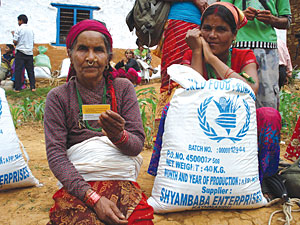 DEWAN RAI |
Rupa Thapa (pictured), 66, of Pagnath village, has put her thumb imprint on legal documents many times. But this time, instead of inking her thumb she was pressing it on a scanner.
"Fingerprint authenticated," says the machine in metallic English. Rupa giggles at the automated response. Instantly, machine operator hands her Rs 1,800 along with a receipt.
Rupa says she will buy food for the family with the money.
Rupa Thapa was the first person in Dailekh to receive a Smart Card under 'Sajilo Banking Sewa' launched by Siddhartha Bank aimed at bringing in Nepal's remote areas into the banking net. As a pilot project, the cards have been distributed to people under the UN's World Food Programme (WFP) cash-and-food in Dailekh.
WFP beneficiaries receive family food rations as well as Rs 90 per day for up to 80 days of labour on community roads, irrigation canals and drinking water projects. Siddhartha Bank is involved and has benefitted 484 households in Pagnath VDC alone.
"E-banking has reduced the security risk in cash distribution in rural areas," explains Moti Prasad Thapa, of the WFP's Nepalganj office. "It avoids wasteful spending of the villagers and helps them to develop a saving habit."
The wages of cardholders are directly deposited into their account from where they can access it by presenting their card to the local agent for verification. The accounts have been opened in the name of women to make sure the money is used properly.
The Smart Card works as a passbook and cardholders can avail all banking facilities through it. Later, Siddhartha will also allow depositers to also collect remittances, pay utility bills and disburse credit and micro-insurance.
A banker travelling to the village carries a portable battery-charged Point of Sale machine linked to bank's online network through mobile telephone service to make transactions. Smart Cards are similar to debit cards, but they use fingerprint for identification instead of personal identification codes, which makes it safer than debit and ATM cards.
"Rural customers in future can enjoy modern banking services from their nearest locality through branchless banking service," says Siddhartha Bank CEO Surender Bhandari (see interview).
According to the Rural Microfinance Development Centre in Kathmandu only a quarter of the population has access to financial services. Siddartha Bank's Easy Banking service has shown that with right technology and little innovation, banks can tap the wealth in the rural market and ease the liquidity crisis.
Says Jhank Narayan Shrestha of Nepal Rastra Bank's initiative to extend banking to rural areas: "Leapfrogging technology can help us bring banking services to the people."
Read also:
Back to the village
Nepali Times spoke to Surender Bhandari, the CEO of Siddhartha Bank, about the challenges and rewards of extending financial services to rural Nepal.


